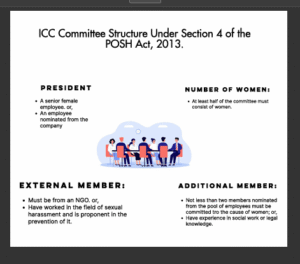
Understanding the POSH Act and the Role of ICCs in Indian Workplaces
In 2013, India took a decisive step to safeguard women at work through the Sexual Harassment of Women at Workplace (Prevention, Prohibition and Redressal) Act, also known as the POSH Act. At the core of this legislation lies the Internal Complaints Committee (ICC), a mandatory redressal mechanism for sexual harassment complaints in organizations with more than 10 employees.
While the POSH Act legally empowers women to report workplace harassment, its effectiveness depends entirely on how well ICCs are constituted, trained, and supported. This blog explores the legal duties, structural requirements, and challenges ICCs face in Indian workplaces.[i]
The Legal Backbone: ICCs Under the POSH Act
The POSH Act, 2013, was enacted after the landmark Vishaka v. State of Rajasthan [ii] judgment. It legally defines what constitutes sexual harassment and outlines mechanisms for redressal.
Section 4 of the POSH Act mandates every employer to constitute an ICC at each office or branch with 10 or more employees. The committee must be formed through a written order and include:
-
- A Presiding Officer, who is a senior-level woman employee
-
- At least two employees with experience in social work or legal knowledge
-
- One external member from an NGO or organization committed to women’s rights
-
- A majority of women members[iii]
Failure to constitute an ICC can result in penalties up to ₹50,000. Repeated violations can even lead to the cancellation of licenses or deregistration.

What Qualifies as Sexual Harassment at the Workplace?
The POSH Act clearly defines “sexual harassment” under Section 2(n) and Section 3, including:
-
- Physical contact and advances
-
- Demands or requests for sexual favours
-
- Sexually coloured remarks
-
- Showing pornography
-
- Any other unwelcome physical, verbal, or non-verbal conduct of a sexual nature[iv]
The Act identifies two types of harassment:
1. Quid Pro Quo: Where submission to sexual advances is tied to job benefits or threats.
Example: “Comply with my request or lose your promotion.”
2. Hostile Work Environment: Where the workplace becomes intimidating or offensive due to sexual conduct.
Example: Repeated sexual jokes, lewd messages, or inappropriate touching.
Filing a Complaint: How the ICC Works[v]
Under the POSH Act, a woman who feels harassed at work can file a complaint with the ICC within 3 months from the date of the incident. The Act also allows other persons (colleagues, friends, family) to file on her behalf with consent.
ICC’s Responsibilities:
- Forward the Complaint to the respondent within 7 working days
- Respondent’s Reply must be submitted within 10 days
- Optional Conciliation can occur before inquiry (no monetary settlements)
- Formal Inquiry must be completed within 90 days
- Inquiry Report submitted to the employer within 10 days after completion
- Employer Action must be taken within 60 days
- An appeal can be filed within 90 days in case of dissatisfaction
Confidentiality must be maintained throughout the process, as per Section 16.

Gaps in Implementation: The Real Challenges
Despite the legal framework, many workplaces fall short in ensuring the effective functioning of ICCs. Key issues include:
-
- Improper constitution of ICCs (missing or unqualified external member)
-
- Lack of training or awareness among ICC members
-
- No annual compliance reporting
-
- Breach of confidentiality during inquiries
-
- Victim-blaming or workplace retaliation
In practice, this often leads to complaints being mishandled, ignored, or invalidated due to procedural errors.
What Employers Must Do: Best Practices for Compliance
To comply with the POSH Act and foster a safe workplace, employers should take a few key steps. Start by holding regular training sessions to educate everyone, employees and ICC members alike, about sexual harassment laws and how to handle complaints. Set up a diverse and qualified Internal Complaints Committee (ICC), including a senior woman leader and an external expert from an NGO or legal background to ensure fairness. Make sure the POSH policy and ICC contact details are easy to find, posted in offices and on employee portals. Keep all complaint details strictly confidential, sharing them only when legally required. Lastly, don’t forget to file annual reports with the District Officer, tracking the number of cases received and resolved. These steps show you’re serious about creating a respectful and safe work environment.
Conclusion
The Internal Complaints Committee (ICC) is not merely a procedural requirement under the Sexual Harassment of Women at Workplace (Prevention, Prohibition and Redressal) Act, 2013 (POSH Act); it stands as a critical institutional mechanism for ensuring safety, equality, and justice in the workplace. It symbolizes an organization’s tangible commitment to safeguarding the dignity of its employees, especially women by providing a structured and confidential forum for addressing grievances related to sexual harassment.
A robust and sensitively operated ICC serves not only as a deterrent to inappropriate conduct but also as an enabler of a workplace culture rooted in trust, accountability, and mutual respect. It reflects the broader legal and moral responsibility of the employer to provide a safe working environment, as mandated under both the POSH Act and Article 21 of the Constitution of India, which guarantees the right to life and personal liberty, including the right to work with dignity.
However, mere compliance with statutory requirements is insufficient. True progress lies in embedding the spirit of the POSH Act within the organizational ethos. This requires proactive measures, regular sensitization workshops, training programs, transparent redressal mechanisms, and visible support from top leadership. Employers must recognize that the ICC is not an isolated legal body, but a cornerstone of ethical governance and inclusive workplace culture.
[i] Mitali Aggarwal, Navigating the Legal Framework for Workplace Harassment in India; (2020) 22 Indian Law
Review 235.
[ii] (1997). 6 SCC
[iii] Sec-4 Sexual Harassment of POSH Act, 2013.
[iv] Sec- 2(n) Sexual Harassment of POSH Act, 2013.
[v] Sec- 9 Sexual Harassment of POSH Act, 2013.
Author By,
Kasak Srivastava,
Under the Guidance of Ms. Jagriti Dugar
